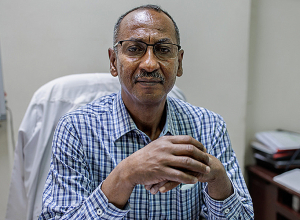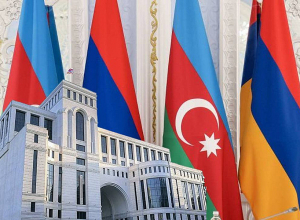
Women Who Experience Domestic Violence Are Often Targeted by Gender-Based Misinformation in Armenia
Support A1+!Knarik Simonyan, a social worker at the "Women's Rights House" NGO operating in Gyumri, tells that during their work, numerous cases have been revealed when an abusive husband spread misinformation about his wife - trying to prevent her from going to the police for protection, or from getting divorced and accepting the violence. It is common for abusers to spread misinformation, falsely claiming that a woman has mental health issues, cognitive impairments, or is immoral.
”They threaten that if you divorce, I will spread this or that about you, I will take the children away from you. And these are women's weak points, as well as a means of establishing and maintaining control over women, and they - the abusers - know this very well," notes the social worker. Gender-based misinformation involves the intentional creation and spread of false, misleading, or manipulative information linked to a person’s gender. It aims to question a person's - particularly a woman's - moral qualities, capabilities, sexuality, mental health, and diminish her dignity.
This type of misinformation is deliberately used to reinforce harmful stereotypes, which in turn serve as tools to harm, silence, and discredit women. "In one case, a young woman was raped in a car by a man she had recently begun interacting with, and to prevent the girl from complaining and going to the police, the boy's parents forced her to marry the man who raped her - threatening that they would go to her neighborhood, shame her mother in front of neighbors, saying she wasn't a virgin. However, later the violence in the family continued in various forms, and the woman left her husband's house with the child," tells Knarik Simonyan, who works with women subjected to violence. The social worker says there have been cases when a pregnant woman miscarried due to her husband's beating, but under certain threats refused to file a complaint, and the police did not conduct an investigation.
"They are in an anxious state, don't know where to start and what to do. Under the influence of violence trauma and fears, they become disoriented. They're afraid that the husband's side will spread rumors, will shame them. We've had a case where a beaten woman said she didn't want people at her workplace to know, and refused to take any steps," tells the social worker.
According to Knarik Simonyan, gender-based misinformation in cases of gender-based violence is especially widespread in rural areas where many people know each other. Despite all this, several women choose the path of struggle - to punish the abuser and protect themselves from him, as well as to recover and heal. Silva (name changed), who lives in one of Shirak region's villages and left her husband with 3 young children when he had been violent towards her for a long time - while threatening that if she divorces, he would spread in the village that she is immoral - is convinced that when a woman who has been subjected to domestic violence for years finds the strength to fight, ignore the slander spread about her and find a way to leave the abuser, she not only saves her own fate but also her children's future.
“For three years, I lived in constant fear,” says Silva. “My husband was diagnosed with a mental health condition. Eventually, he began physically abusing me and verbally degrading me.” Her husband's parents also threatened that if she divorces, they would spread in the village that she has a "lover" and that's why she's divorcing and breaking up the family.
And that's what they did. Unfortunately, Armenia's law enforcement system doesn't always respond adequately to domestic violence cases. Law enforcement officers sometimes don't even shy away from blaming the victim, which can lead to silencing women, as the woman experiencing violence starts to distrust the police.
When Silva's husband beat his ex-wife again after the divorce, the woman went to the police and received this response: "The police chief said - well, he's a man, he hit once, and you don't get divorced for that, do you? Don't you know that arguments happen in our families too? He's a man, he got angry, he hit. Those words made me feel worse. I realized I was alone, no one was by my side, I felt terribly unprotected. Fortunately, the police officer handling the case was a woman who, seeing me leaving the chief's office crying, said - don't worry, don't think you're alone, we're by your side, and we’ll properly investigate the case." The subsequent investigation process was also stressful for the victim.
The female investigator at Gyumri's Investigation Department asked if it was possible that you provoked him to hit you, your ex-husband said he was jealous, that's why he hit. "I was shocked. I said, how do you imagine - am I stupid to provoke someone to beat me? And is hitting allowed by law in case of jealousy?
Nevertheless, the investigator concluded that you're a well-groomed woman, naturally he was jealous," tells Silva. According to OxEGen Foundation's 2024 report "Gender Misinformation in Armenian Media," one of the most common discourses of gender misinformation is victim-blaming discourse: "The victim is subjected to secondary victimization, moreover, this can be done not by directly blaming the latter, but by using 'subtle', indirect, sub textual, 'seemingly naive' words, phrases or sentences. This is one of the active tactics used during gender misinformation."
Silva's complaint has been under court examination for 2 years already, but court sessions are periodically postponed and there's still no decision. Now the 34-year-old woman does various jobs to support her 3 daughters and has big plans for her future. "I'm going to apply to university, study to be able to have a good job. I want to participate in local government elections and engage in politics. I'll also try to break the stereotype that a single woman is weak or must support her children through immoral ways. I'll try to show that a single woman is stable, very strong and can support her children through her work and have a role in society," says Silva.
The Investigation Committee of Armenia informed us that in 2024, 2309 proceedings related to domestic violence were investigated in Armenia, of which 1548 proceedings were initiated in 2024, and 761 were transferred from 2023. From these proceedings, 405 were sent to court with indictments regarding 416 persons. 735 proceedings related to domestic violence were dismissed. 568 proceedings will continue to be investigated this year. In Armenia, during just the first five months of 2024, 5 cases of women's murder in the family were recorded.
These alarming statistics highlight the urgent need for women to break the silence on domestic violence, as their safety and lives are at stake.
Women subjected to violence can contact: Women's Support Center: 099 88 78 08 Police: 102 Ministry of Labor and Social Affairs: 114 Human Rights Defender's hotline: 116, +37496116100 (mobile), +374-96-116100 (Viber), +374-96-116100 (WhatsApp)
Marine Kharatyan



